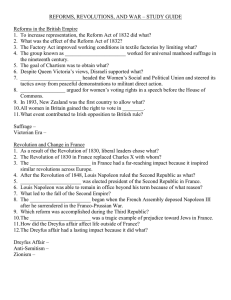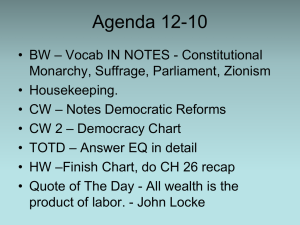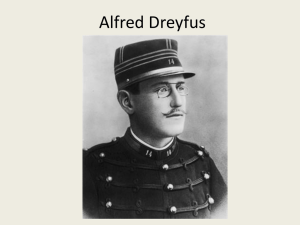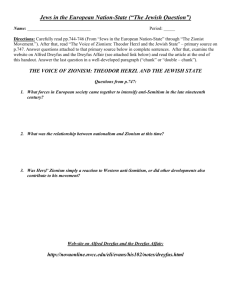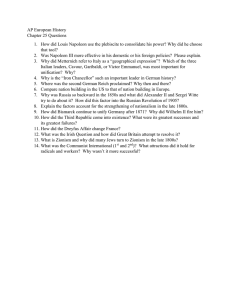lecture powerpoint sldies
advertisement
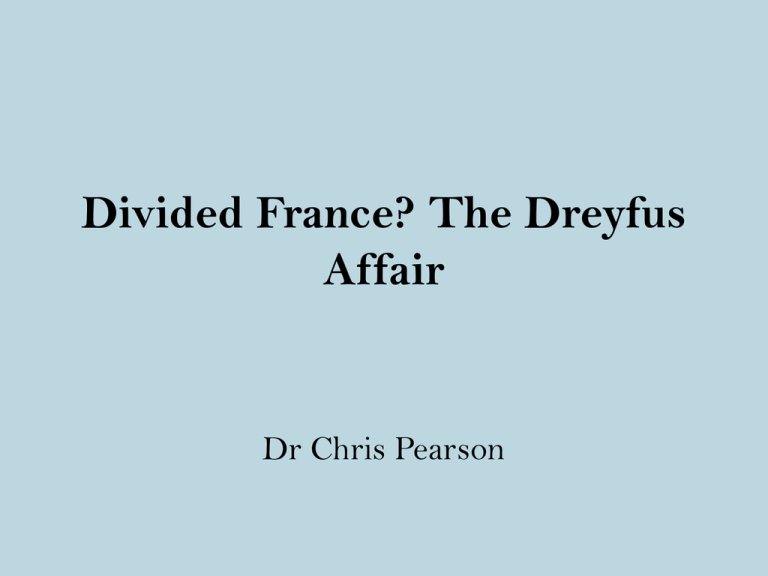
Divided France? The Dreyfus Affair Dr Chris Pearson The Dreyfus Affair • Causes • Consequences • Historians’ interpretations The beginnings of the affair • “Discovery” of the bordereau in the Germany embassy (25 September 1894) • Statistics Section concludes that Dreyfus is the culprit, after a rapid investigation and comparison of handwriting • Dreyfus arrested on 15 October 1894 and held at in military prison ‘I am totally innocent and protest vehemently against the rigorous measures taken against me. Never have I communicated to anyone at all even the briefest note relating to my service at the General Staff […]. It is my honour as an officer that I am defending and however painful my situation might be, I will defend myself to the end. I sense, however, that an appalling plan has been prepared against me, for a purpose I do not understand, but I want to live to establish my innocence.’ Dreyfus during his initial interrogation, quoted in Whyte, The Dreyfus Affair (2005), 346 ‘The traitor’: drawing by Henri Meyer, Le Petit Journal illustré, n° 217, 13 January 1895 ‘As he came towards us, his kepi pulled down over his forehead, his pince-nez on his ethnic nose, his eyes furious and dry, his whole face hard and defiant, he cried out – what am I saying? – he ordered in his unbearable voice, ‘You will tell all of France that I am innocent…’ His face of foreign race, his impassive uprightness, his whole being revolted even the most self-controlled of spectators.’ Maurice Barrès, quoted in Whyte, The Dreyfus Affair (2005), 353 ‘I was suffering agonies, but steeled myself to concentrate all my strength. To sustain myself, I evoked the memory of my wife and children. As soon as the sentence had been read out, I called out, addressing myself to the troops: ‘Soldiers, you are degrading an innocent man: soldiers, you are dishonouring an innocent man. Long live France, long the army.’ Dreyfus, quoted in Whyte, The Dreyfus Affair (2005), 354 The case refuses to go away… • Dreyfus on Devil’s Island continues to declare his innocence • His brother Mathieu and wife Lucie protest his innocence • Lucien Herr, the librarian at the prestigious Ecole normale supérieure, convinces Clemenceau and Jaurès of Dreyfus’ innocence ‘Judas defended by his brothers’: La Libre parole attacks Bernard Lazare’s A Judicial Error: The Truth about the Dreyfus Affair (1896) Major Ferdinand Walsin Esterhazy: ‘a swindler and incorrigible liar and intriguer.’ LieutenantColonel Georges Picquart: discovers evidence proving Dreyfus’ innocence which is eventually picked up by Auguste Scheurer-Kestner, Vice-President of the Senate Intellectuals wade in… • Zola accuses the military of a cover up and names key officers • Furthers the efforts of Bernard Lazare • Zola backed by other intellectuals, including Marcel Proust and Charles Péguy • Small but vocal minority ‘I have raised a cry of alarm, and I leave history to judge me and to appreciate my acts […]. I am not defending my liberty, gentlemen in presenting myself before you. I am defending the truth. Look me in the face, gentlemen. Have I been bought, or am I a traitor? I am a free writer, who intends to resume his vocation and again take up his interrupted labourers.’ Zola at his trial, quoted in Whyte, The Dreyfus Affair (2005), 378 Charles Maurras: royalist, nationalist, antiSemite, anti-Dreyfus, and founder of Action française in 1899 An antiDreyfusard politician: minister for war Godefroy Cavaignac Joseph Henry- forger of documents, who commits suicide The Republic under attack • Jules Guérin meets royalist pretender • Paul Déroulède leads botched coup d’état (Feb 1899) • Right-wing protesters knock off President Loubet’s top-hat at Auteuil races (right) Defending the Republic • Waldeck-Rousseau’s government of ‘republican defence’ • Arrests Jules Guérin and his royalist backers • Retrial of Dreyfus at Rennes: found guilty ‘with extenuating circumstances’ by 5 votes to 2 • Dreyfus receives presidential pardon on 19 September 1899 The end of the Affair? ‘When disagreements have divided and torn apart a country all men of political wisdom understand that the time comes when these need to be forgotten.’ Waldeck-Rousseau ‘Either way, at the end of the argument concerning details, there lies a grand theory, an interpretation with the widest implications. It is as if the facts are not enough in themselves, or as if their complexity is unbearable. The historian, like the poet, aspires to achieve order amid chaos and meaning in the middle of confusion. The facts have to be placed in some sort of pattern.’ Douglas Johnson, France and the Dreyfus Affair (1961), 199 The affair’s political dimensions • The Affair ripped apart the anti-socialist alliance of republicans and conservatives • Republic seemed under threat – its partisans united to defend it • The Republican, Radical and Radical-Socialist Party was founded in 1901 to rally ‘all the sons of the Revolution, whatever their differences, against all the partisans of counter-revolution.’ Dreyfus Affair as part of the guerre franco-française • Revolutionaries • • • • Republicans Secular Dreyfusard Resistance (1940-44) • Counterrevolutionaries • Royalists • Catholic • Anti-Dreyfusard • Vichy Regime (194044) ‘Two concepts of legitimacy clashed: one based on the idea of a rational, secular, Jacobin state open to all citizens, the other based on an idea of “Frenchness” understood in terms of local roots, of an organicist localism said to foster a virility capable of overcoming the decadence brought on by effeminate, cosmopolitan humanism.’ Pierre Birnbaum, ‘Grégoire, Dreyfus, Drancy and the Rue Copernic,’ in Nora, Realms of Memory (1996), 409 ‘True France’ • Emergence of right-wing, exclusionary nationalism after the Affair • ‘The discourse of True France employs the essentialist, determinist language of a lost hidden authenticity that, once uncovered, yields a single, immutable national identity.’ Herman Lebovics, True France (1992), 9 • Forerunner of French fascism, according to Robert Soucy, Zeev Sternhall The Jewish community in France before the Dreyfus Affair • “Emancipation” during the Revolution, led by Grégoire – Jews granted civic equality • But anti-Semitism continued – pogroms in Alsace, Napoleon’s 1808 decree • Distinction made between highly assimilated “Israélites” and “Juifs” - Yiddish speaking new arrivals from Russia and Eastern Europe The Jewish Community during the Dreyfus Affair • Dreyfus Affair- high tide of anti-Semitic feeling in 19C France (Marras, Politics of Assimilation [1971]) • Tested assimilated Jews faith in the Republic • But majority of Jewish Dreyfusards saw defence of Dreyfus as a defence of the republic ‘It is we who are defending the honour of the army.’ Dreyfusard Joseph Reinach ‘In the light of the Dreyfus case, the whole of the gentile world seemed to him hostile; there were only Jews and antisemites.’ Hannah Ardendt, ‘From the Dreyfus Affair to France Today,’ Jewish Social Studies 4/3 (1942) Theodore Herzl Stripping away Dreyfus’ honour and manhood? See Venita Detta ‘From Devil’s Island to the Pantheon?’ in Forth and Accampo (eds) Confronting modernity in Fin-de-Siecle France (2009) Gender and the Dreyfus Affair • Both sides attacked the other’s manhood • Anti-Dreyfusards mocked the supposedly weak and unhealthy bodies of the intellectual Dreyfusards • They also portrayed Dreyfus himself as weak and effeminate (stereotype of Jewish men) • See Christopher Forth, The Dreyfus Affair and the Crisis of French Manhood (2004) Zola aux outrages by Henri Degroux La Vérité sortant du puits, by Édouard DebatPonsan
